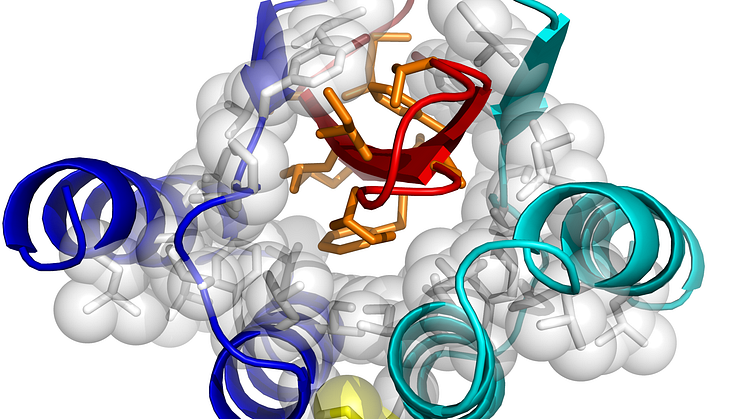
Pressmeddelande -
Protein engineering advancing Alzheimer’s research
No one has yet found a cure or a way to prevent people from developing Alzheimer's disease. Researchers from the Swedish University of Agricultural Sciences, among others, are breaking new ground in biotechnology to find new tools that can help provide new solutions. A protein constructed by these researchers has yielded experimental results that are promising when it comes to stopping the disease. And for the first time, using protein engineering, it seems they have successfully created the oligomer that is believed to trigger the disorder.
Alzheimer's disease is the most common form of dementia. In the 60-64 age group, one percent have the disorder, and among people age 85 and older, 25 percent are affected. At present there is no cure for Alzheimer's. Those who develop it grow gradually worse, and the disease leads to death, often after several years of sickness. Besides the tragedy entailed when people contract Alzheimer's disease, the healthcare involved consumes huge resources.
Symptoms of Alzheimer's disease begin with loss of memory. The disorder is caused by damage to the nerves in the brain. This damage is caused by so-called oligomers of the peptide Aß, which is also found in amyloid plaques, a kind of precipitate, that accumulate in the brain.
At the Swedish University of Agricultural Sciences (SLU) in Uppsala, Sweden, Professor Torleif Härd of the Department of Molecular Biology is directing a research project that is developing new biotechnological tools that could be used to in research and as potential therapies. They are deploying protein engineering, and experiments have yielded highly promising results.
One of the strategies for finding an answer to how Alzheimer's disease could be prevented is based on the idea of adding a protein to the blood, to bind to the Aß peptide there. In this way the Aß peptide becomes harmless, and the disease might be prevented.
The research team has studied how an artificial so-called Affibody protein entirely encases the Aß peptide, thereby preventing the formation of toxic forms.
"Nothing like this has ever been done before, and the results have attracted a great deal of attention," says Torleif Härd. "Our success in also determining the structure of this complex constituted a breakthrough, because it paved the way for new ideas for further research."
Now the SLU scientists, working with teams from the Royal Institute of Technology (KTH) in Stockholm and Affibody AB, are seeking to alter the characteristics of the Affibody protein so it won't be broken down when it enters the blood. The strategy is also being tested in flies, and the preliminary results indicate that the strategy works.
Another strategy involves using protein engineering to stabilize the toxic oligomers that are the cause of nerve cell death and memory loss. Oligomers are a stage halfway between the Aß peptide and amyloid plaques. In the laboratory environment they survive only about 15 minutes, making it impossible to study them. If these oligomers can be stopped, it should be possible to prevent Alzheimer's disease from breaking out. To find out more about the structure and mechanism of these oligomers, scientists need to stabilize them in order to examine them, and this is something the scientists in the project have managed to do: they have create a stable oligomer with the same toxic properties as before.
"We are now busy determining the 3D structure of the oligomer. This is important if we are to be able to further study the molecular mechanisms, and it may lead on to drug development," says Torleif Härd. In collaboration with MIVAC Development AB, they are also investigating the possibility of directly developing a vaccine against the disease.
The project is a collaboration involving scientists at SLU, Professor Stefan Ståhl's team at KTH, Professor Lars Lannfelt's team at Uppsala University, Professor Christopher M. Dobson's team at Cambridge in England, Affibody AB, and MIVAC Development AB.
The title of the research project is:
Protein Engineering and Alzheimer's Disease: New Tools for Research and Potential Therapeutics
Research reports from the project:
http://www.pubmedcentral.nih.gov/articlerender.fcgi?artid=2278213
Contact:
Research Director, Professor Torleif Härd, Department of Molecular Biology, SLU Uppsala, e-mail: torleif.hard@molbio.slu.se, phone: +46 (0)18-471 40 55



